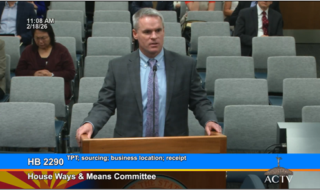February 3, 2024 Last Edit: June 5, 2025
State Director Patrick Connor reports from Olympia on the small business agenda for the legislative and political week ending February 2
The January 31 policy committee cut-off eliminated nearly 50 bills from our tracking list. In many cases, a companion bill in one chamber “died” while the version in the opposite chamber continued to advance. In other instances, both companion bills failed to win committee approval by the deadline. Some bills of note that did not survive Wednesday’s cut-off include:
- HB 1523, SB 5476, Agricultural worker overtime Despite a courtesy hearing given to SB 5476 this week, neither bill survived cut-off. Both would have allowed growers to establish a 12-week period during which farm laborers could work additional hours without being subject to overtime, as is the practice of most (if not all) other states that have imposed overtime requirements. The Senate Labor & Commerce Committee heard gut-wrenching testimony from small, family farm operators at risk of losing the farm, and workers whose take home pay has plummeted due to these restrictions. Nevertheless, the committee refused to approve the bill. NFIB supported this legislation.
- HB 1868, HB 2051, Power equipment and off-road engine emissions Both bills seeking to limit carbon emissions from landscaping and other small engine equipment were referred to the House Environment & Energy Committee. HB 1868 failed to even receive a hearing. HB 2051 was heard but was not scheduled for executive action. NFIB opposed both bills.
- HB 1933, SB 6276, Right to Repair Despite overwhelming support among those signing-in on the bills, Apple’s intransigence, along with objections from Farm Bureau and a national farm equipment dealers’ association, managed to derail the bills. Again. NFIB supported the bills.
Other bills where NFIB has engaged that are moving forward include:
- HB 1905, SB 5894, Including protected classes in equal pay act Both bills are advancing, though in slightly different forms. As we previously reported, the House Labor Committee added language allowing a worker to file a complaint for each protected class in which they identify. The Senate version would kick the effective date to July 1, 2025. The bills still would allow different findings for the same complaint between two different enforcement agencies. For that reason, NFIB opposes both bills.
- HB 2382, Concerning workers who menstruate or express milk Negotiations led by construction industry and labor groups are underway. It appears that labor may be willing to accept more reasonable requirements and agency educational outreach. Meanwhile, the bill was made eligible for a floor vote February 2. NFIB remains opposed pending the outcome of these negotiations.
- HB 2437, Retirement savings options The House Consumer Protection & Business (CPB) Committee heard dueling proposals on this topic last week. That committee chose to amend and approve HB 2437 as a study bill to look at various options to spur small-business employee participation in some type of retirement program. This appears to be a reasonable approach, particularly since none of the proposals thus far would repeal the under-resourced and under-performing Small Business Retirement Marketplace. The amended bill calls for a representative of small, independent businesses to be included amongst the workgroup’s membership. NFIB will change its position from concerns to support if the bill is scheduled for hearing in House Appropriations.
- SB 6069, Washington Saves retirement program Meanwhile, the Senate Way & Means Committee today approved NFIB-recommended amendments and passed the bill. We expect it will be reported to the Rules Committee on February 5. NFIB thanks bill sponsor, Sen. Mark Mullet for working with us on amendments addressing our concerns. We will be changing our position from concerns to neutral.
- SB 6085, Re-establishing the underground economy task force The bill was approved by the Senate Labor Committee this week and is scheduled for public hearing in Senate Ways & Means February 2. We received information that despite the absence of any amendments, the sponsor intends to include representatives from the homebuilding industry and small business among the task force membership. With that assurance, NFIB will move from concerned to neutral on the bill.
- NFIB’s HB 2430, Waiving business licensing handling and delinquency fees for eligible businesses The bill won unanimous approval from the House Consumer Protection & Business Committee (12-0) on Wednesday, the last day for policy committees to report out bills. It has been referred to the House Rules Committee, and Rep. Mari Leavitt has already offered to pull the bill at the next Rules Committee meeting. A “pull” is the process to move a bill through the Rules Committee so it can be made eligible for a floor vote. We thank our sponsor, Rep. Larry Springer, CPB committee chair Rep. Amy Walen, and Rep. Leavitt for their efforts on this NFIB priority bill.
Previous Weekly Reports and Related News
NFIB is a member-driven organization advocating on behalf of small and independent businesses nationwide.
Related Articles














